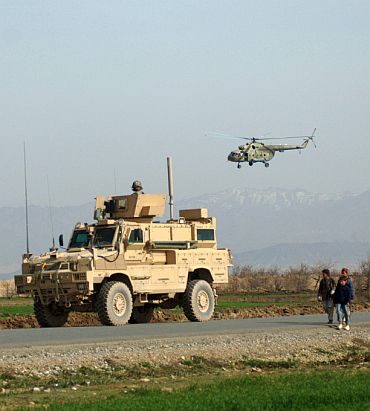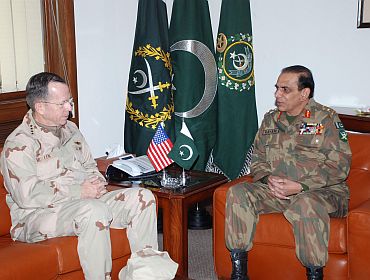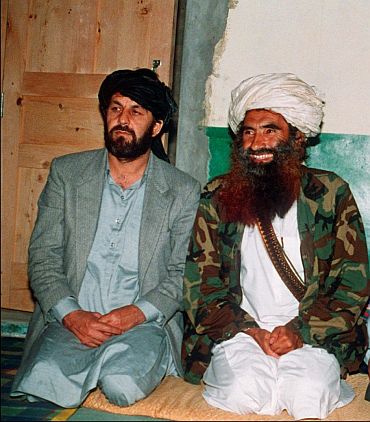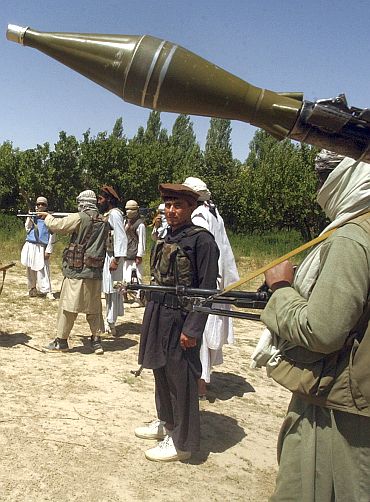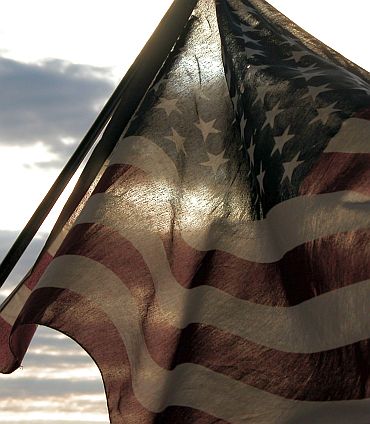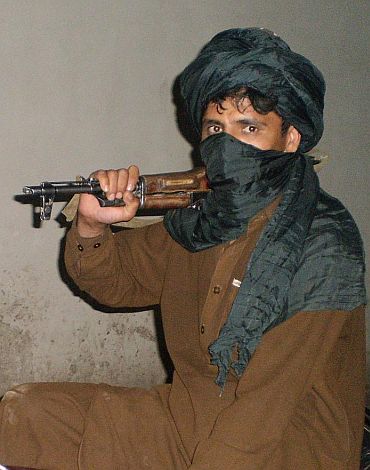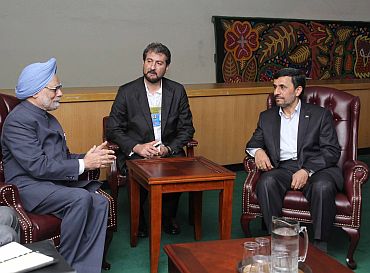 | « Back to article | Print this article |
Afghan endgame: As Americans retreat, India needs plan B
Rajeev Srinivasan on India's reduced options in Afghanistan, now that it seems like the Americans have finally lost the war
Two singular events took place recently that lead me to believe that the unthinkable has finally happened: the Americans have lost the Afghan war.
First was the assassination of Burhanuddin Rabbani, former president of Afghanistan, and chairman of the High Peace Council attempting to reach a negotiated settlement with the Taliban.
Second was the explicit accusation by Admiral Mike Mullen, the outgoing American Chairman of the Joint Chiefs of Staff, that Pakistan's Inter Services Inteligence was behind the recent, audacious attack on the US embassy in Kabul (the assault was rather too professional and well-planned for non-State actors to have done it).
Things are so bad that the New York Times, which is essentially the voice of the US establishment and therefore generally supportive of Pakistan, has seen fit to thunder in an editorial titled The Latest Ugly Truth About Pakistan that something must be done. They stopped short of specifying what that something might be.
Click on NEXT to read further...
Afghan endgame: As Americans retreat, India needs plan B
Brian Cloughey, a Briton known for closeness to the Pakistani establishment, went one step further in Is this a price worth paying?, and told off the Americans.
Said he in The News International, "I know the Pakistan Army, and I state flatly that man-for-man it will hammer any opponent, no matter if the skies are horizon-filled with US bombers." I guess that means that the Pakistanis are slightly worried.
There is an irony somewhere in the fact that the ISI has comprehensively hoodwinked the Americans into (unwittingly?) funding the ISI's attacks on American interests, not to mention their troops. It is not beyond the realm of possibility that the ISI had a hand in planning the 9/11 attack on the World Trade Centre: they are good at tactical support for large-scale operations, such as the 11/26 siege of Mumbai and the assault in the heart of Kabul where operatives held security forces off for 20 hours.
It is remarkable how the ISI has mesmerised the Americans. The metaphor that comes to mind is that apocryphal tale of how a cobra can hypnotise its prey into paralysis before it strikes. It is a thing of wonder, this willing suspension of disbelief by the Americans in the face of Pakistan's diplomatic theatre.
Click on NEXT to read further...
Afghan endgame: As Americans retreat, India needs plan B
It is widely known that the ISI's allies, ranging from Gulbuddin Hekmatyar to the Haqqani Network, had benefited greatly from CIA largesse during the Soviet Afghan campaign. Hekmatyar, now a sworn enemy of the Americans, alone is said to have receive 40 per cent of all the millions the CIA invested in overthrowing the Soviet-installed Najibullah regime.
The Haqqani Network was once lionised by Americans, one of whose politicians went so far as to claim that Jalaluddin Haqqani was the "very picture of goodness", according to Praveen Swami ('Pakistan, US and the immoderate Taliban', The Hindu, September 22). Now the Haqqanis, fairly or unfairly, are being blamed for every attack on NATO targets in Afghanistan. It is likely that 'Haqqani Network' simply means 'ISI'.
As early as November 2001, during the first part of the Afghan campaign, it was obvious that what was being marketed as the 'Taliban' was basically officers of the ISI and the Pakistani Army, who had merely exchanged their khakis for baggy pants and black turbans, and grown beards.
Click on NEXT to read further...
Afghan endgame: As Americans retreat, India needs plan B
During the siege of Kunduz, when the Northern Alliance were on the verge of overrunning a fort where the 'Taliban' were cornered, the CIA allowed the Pakistanis to airlift a thousand of them, who it turned out were brigadiers and colonels in the ISI and the Pakistani Army.
I wondered then if the Americans, nominally supporting the Northern Alliance, were in fact doing so or not.
What happened in Kunduz?
Thus, the ISI has mastered the fine art of running with the hares and hunting with the hounds; the Americans have been turned into patsies. The net result is that after a trillion dollars and thousands of dead troops, America has been defeated by a so-called ally. (Although American analysts are now belatedly pointing out that the 'alliance' was a figment of somebody's febrile imagination.)
The so-called peace talks with the 'Taliban' are dead along with Rabbani. As an ethnic Tajik, former president, and close associate of the national hero and military genius Ahmed Shah Massoud, the former commander of the Northern Alliance, Rabbani had the credibility to broker a deal with the ethnic-Pashtun Taliban, assuming the latter were interested in such a deal.
Click on NEXT to read further...
Afghan endgame: As Americans retreat, India needs plan B
In fact, the Taliban are not interested, for several reasons. First, because they are a proxy for the ISI, which is focused like a laser on Pakistan's interests, not America's. Second, because the Taliban sense they are winning militarily. Third, because the Americans are so desperate to declare victory and run like hell (as a result of Obama's rash promise to wind down in 2012) that they will offer more and more concessions.
In effect, the only ones who have benefited from the collapse of American clout are the Arabs, the Pakistanis and the Chinese. The Arabs, especially the oil-exporting dictatorships (with the sole exception of Libya) have managed to maintain their status quo ante, and they have parlayed the billions from an oil-addicted world into radicalised millions everywhere through insistent propaganda.
The Pakistanis have achieved their coveted 'strategic depth' in Afghanistan which is, in effect, their colony. True, there has been some cost to them in civilian casualties and the Frankenstein monster of internal terrorism, but that is collateral damage the Army is willing to accept in the pursuit of their strategic goals.
And true, this may turn out to a Pyrrhic victory because they may not be able to contain Pashtun nationalism and disdain for the Durand Line forever: there will almost certainly be a Pashtun nation at some point, and possibly Baluch and Sindh nations. Nevertheless, it is a signal victory: this is the second superpower in a row that they have defeated.
Click on NEXT to read further...
Afghan endgame: As Americans retreat, India needs plan B
The unkindest cut is perhaps that China has won against the Americans. Again. This is the third military conflict where China has had the better of the Americans. In Korea, they fought to a standstill. In Vietnam, a then-Chinese ally defeated the Americans. In Afghanistan, Chinese ally Pakistan is doing this. This must be China's dream come true: they are beating the Americans militarily and economically.
All this leads to a particularly bad situation for India.
The jihadist terrorists of the ISI, once they have gotten rid of the Americans, will have a field day with India: they would have taken a big step, with the annexation of Afghanistan, towards their age-old fantasy of a fundamentalist emirate in the region with Islamabad as its capital. They will be even more triumphalist and will plan regular terrorist attacks on India.
India's options are limited. India's only ally in the region has been the Northern Alliance; with Massoud and now Rabbani gone, the best bet still are the Panjshiri Tajiks, who held out in their mountain fastness against the Soviets and later the Taliban, and whom the Pakistanis loathe. India should not be led down the garden path again by ideas of amity and friendship with the Taliban.
Click on NEXT to read further...
Afghan endgame: As Americans retreat, India needs plan B
The Taliban has shown bad faith again and again. First, they assassinated the generally wary Massoud on the eve of 9/11 using suicide bombers masquerading as cameramen interviewing him. The bomb was in the camera. Then, despite the olive branches held out, they betrayed a hapless India in the Kandahar hijacking incident. Now, in the pretext of peace talks, they assassinated Rabbani. None of this should be surprising, as the Taliban have learned at the ISI school of international relations.
Further, India should learn to impose some pain on the ISI. The problem is that they know they can do pretty much anything to India, and that there are no consequences: the worst India will do is to dossier-bomb them. There are many ways in which India could possibly impose salutary pain in response; one might well be to arm separatists with weapons with Chinese markings. (That would only be fair: the Chinese have been sending fake drugs to Africa marked 'Made in India').
Another would be to foment uprisings among the various restive minority populations. But then, in a fit of misguided goodwill, a previous prime minister emasculated RAW's presence in Pakistan. I wonder if informants' names were even leaked out.
Click on NEXT to read further...
Afghan endgame: As Americans retreat, India needs plan B
A third way forward would be to work more closely with Iran, the other regional power that has a serious interest in Afghanistan. That may not please the Americans, but then India's efforts to please Americans have resulted mostly in a one-sided nuclear deal and vague promises of a Security Council seat; nothing more.
Maybe working with Iranians will bring some benefit.
India should continue to support the Karzai regime; the good work in road, school and hospital building that India has done is appreciated by the Afghan public. But there is no point in putting all the eggs in the Karzai basket when even the Americans are distancing themselves from the regime they put in place.
America is losing the war; the optimistic statements emanating from the US remind me of General Westmoreland repeating rosy predictions about Vietnam that had no relationship with reality.
India should try to make sure that it has a Plan B to increase its relevance in a post-American scenario. As things stand, despite the millions India has invested, Pakistan is running away with the prize.
Click on MORE to read another feature...
